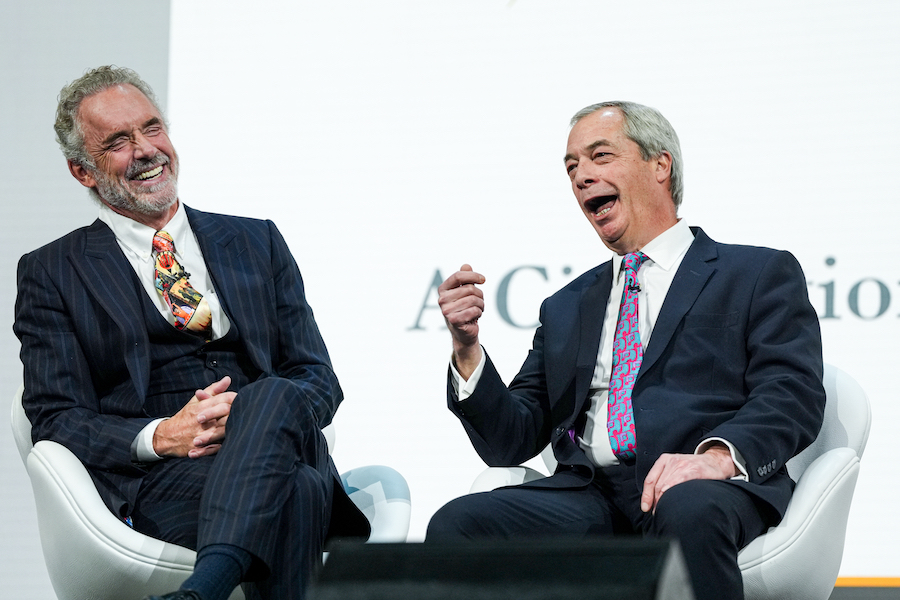This is an edited transcript of a conversation between Jordan Peterson and Nigel Farage at the 2025 Arc Conference.
Jordan Peterson: At the Arc conference yesterday, Scott Tinker outlined a vision of the future, and it’s not a net zero vision, I can tell you that. It’s a vision where we cooperate to do everything we possibly can to drive energy prices down as low as they can possibly be, using everything at our disposal. Nuclear, coal, gas, oil, solar, wind, whatever can compete. Because the most effective way of enriching the absolutely poor and serving long-term environmental needs is to make people wealthy so they can afford to care about the future, especially in the developing world. And so I’m kind of wondering: do you have an opportunity now – because the right is split in the UK – to really hash things out on the conservative side? This sort of thing happened in Canada, and that means that it’s possible now for conservatives to push the envelope. I’m really curious about your view on it: it isn’t exactly even on net zero, which I think is an appalling policy to get that right out on the table. But more than that, it’s like, how appalling is it?
Nigel Farage: First things first: the right is not split in this country. The Conservative party is not on the right for any measure of individuals. Fourteen years (of Tory government) has brought us the highest tax burden since 1947; fourteen years that saw legal mass immigration on a scale hitherto never even dreamt of. Fourteen years that saw illegal immigration, small boats crossing the Channel, and the government completely incapable of dealing with it because they couldn’t face up to what membership of the European Convention of Human Rights was all about. And fourteen years that saw net zero enshrined into law by a Conservative government and Boris Johnson, Theresa May were as evangelical about net zero as Ed Miliband. We take the view that if we’re going to be using gas, if we’re going to be using oil in this country by 2050, and even the most zealous net zero types, expect we’ll be using these commodities for years to come.
Our view is if we’re going to be using them, we may as well produce them ourselves in our own country and genuinely be energy independent. And our platform is to reindustrialise Britain.
We’ve closed down our steel industry. We think closing down the steel industry is good because it means our national CO2 output is down – and all that happens is the plant closes in Redcar. The plant closes in south Wales. It reopens in India under lower environmental standards and then the steel is shipped back to us.
So let’s produce all the stuff we need in this country. Let’s become not just energy independent. We could actually become an energy exporter. Right now, every day we import 10 to 15 per cent of our electricity, and our industrial energy prices are between 4 and 6 times higher than America. Not only that, but everybody out there, because this hurts the poor more than anybody. We have had 20 per cent subsidies on domestic electricity bills going on now for the best part of two decades. And it’s a truth that no one dares tell. So net zero is a complete and utter disaster. If you want to have energy production that is very, very low in carbon output, there is only one way ahead. That is small modular nuclear reactors.
It’s the only way forward. And, you know, if you look at the way the Far East produces nuclear energy, we can do it a damn sight cheaper than we’ve ever done it before.
Jordan Peterson: Okay, well, that warms a Canadian’s heart. One of the things I’ve been discussing with my fellow Canadians, let’s say, is the fact that, maybe it’s time to stop our obsession with carbon altogether. And so I’m going to say something relatively radical. Let’s just play this out and see how it goes. So, you know, I reviewed a lot of scientific papers. Now, they’re not climate papers, but I’m a reasonable hand to separate the wheat from the chaff on the scientific front. When I look at the carbon data, there is one fact that leaps out to me in my experience with scientific data. The most stunning effect of atmospheric carbon that has been recorded scientifically is the effect of carbon on plant growth. In the last 25 years or thereabouts, 20 per cent of the Earth’s surface is green. 20 per cent is a lot. It’s a lot. It’s an area equivalent to twice the size of the continental US. So that gives you a quick picture of scale.
And it’s also primarily green in semi-arid areas because when you give plants more carbon dioxide, their stomata close. And so they can live where it’s drier. And so the deserts are shrinking, not growing, which is exactly the opposite of what we were told was going to happen. And crop yields are up something approximating 10 to 13 per cent. So that’s not bad. That’s good. I’m curious about how far this needs to be taken. I also think, conceivably, that the environmentalist climate scam was really an offshoot of the Club of Rome, Malthusian stupidity that is predicated on the presumption that resources are finite and that there’s far too many people on the planet. There’s a terrible, anti-human motivation lurking underneath all of that: brutal and genocidal in its fundamental ethos. I think it’s time for people who would like energy to be inexpensive and reliable to say: no more carbon fear-mongering and terrorising.
Nigel Farage: That’s the one thing that drives me absolutely potty: when I hear that carbon dioxide is a pollutant. That’s what they tell us. That clearly is absolutely nuts. Now, there are times in our past when CO2 in the atmosphere has been much, much higher than it is today. That’s before people drove 4×4 Chelsea tractors. And I remember having this debate about 20 years ago. There was a man called Sir Patrick Moore: a very famous scientist. Great character, a very respected man. And I said to him about 12 years ago, ‘Patrick, what do you think about man’s impact on the environment through CO2?’ He said, ‘well, it’s impossible to think man doesn’t have some sort of impact’. He said, ‘Well, when it comes to carbon dioxide levels and when it comes to warming and cooling, let me assure you that sunspot activity and underwater volcanic activity will always have a bigger impact on the environment than man himself ever can’. And I very much stuck to that view.
So I’m not a scientist. I can’t tell you whether CO2 is leading to warming or not. But there are so many other massive factors. So we do, as you rightly say, need to get this debate into a sense of perspective. And I sometimes think that the carbon dioxide hysteria has actually blinded us to other environmental disasters that are going on, such as the rape of our oceans and many other things. I’m an environmentalist in the old school sense and definition of that term, but more common sense.
***
Jordan Peterson: I spent a fair bit of time speaking with authorities in Hungary about their family policy. Hungary spends a substantial amount of their GDP on family policy. They were concerned about a variety of issues: the high rate of abortion, high rate of divorce, low rate of female participation in the workforce, which is kind of a strange addition to that group, and an extremely low birth rate. And so they made it a priority to address those. They’ve had some success reducing abortion, which is still legal in Hungary; substantively reducing the divorce rate; flattening the decline in the birth rate. They haven’t managed to pop it up again: only Israel has managed that, by the way. And it’s not exactly obvious why. We argued this out amongst the Arc members, and our consensus by the end was that the core of civilisation as such and the western civilisation that we’re attempting to reinvigorate, let’s say, is, first of all, a circle of tolerance.
So we’ll make that the a priori axiom. But then a commitment to long-term, stable, married, monogamous, heterosexual, child-centred marriages – that’s a fairly restrictive ideal. Ideals are restricted. We’re all cognisant of the fact that within our own families, for example, 40 per cent of our siblings, let’s say, are likely to be divorced, that there’s no shortage of single mothers, that homosexuality and homosexual couples exist and that there’s going to be deviations from the norm. But I’m curious, again, you could make the case that stable, committed, monogamous, heterosexual, child-centred monogamy is the kind of long-term commitment to community. That’s the fundamental unit of civilised, organised society. And so I’m curious, what do you think about that?
Nigel Farage: Well, I may not necessarily be the best advocate for monotonous heterosexuality and or stable marriage, having been divorced twice. But do I think family matters. Jordan, on 3 June last year, as I was coming into London by car to go back into politics, having left it a few years before, my ambition was to get the United Kingdom to be a self-governing, independent nation. And for many, many years, I was pretty much on my own fighting that battle. The day we left the European Union, I thought, right, I’ve done my job. And that day, on the 3 June, when I was coming back thinking, ‘well, you know, this really rather comfortable, lovely life I’ve got is about to disappear’, I thought, why am I doing it? And I came up with three words: ‘family, community and country’. They’re the things that matter to me about absolutely everything. I have tried, in difficult circumstances, to make sure with both ex-wives that our children have had a stable upbringing, given the circumstances, as they can possibly have. We’ve kind of forgotten that what underpins everything is our Judeo-Christian culture, and that’s where we need to start. That’s what we need to start.
We recognise that and we value that. So yes, of course, family matters enormously. Of course we need higher birth rates, but we’re not going to get higher birth rates in this country until we can get some sense of optimism. And we need a complete 180-shift in attitudes. We’ve got to start telling young kids that hard work is good, that success is good, that there are no shortcuts in life, that making money is good. And what I see is we sort of disincentivise young people. To think that another million young people since the start of the pandemic are on disability benefits because they’re suffering from depression, and the doctors signed them off. We need some very, very big cultural changes. We’ve got to get that spirit, that sense of optimism back in the country. And we had it in the late 1980s. We actually had it through much of the 1990s. That’s what we have to recapture. And frankly, being led as we are – I mean, God, doesn’t Rachel Reeves just make you want to reach for the cry tissues? I mean, it’s all so miserable. It’s also declinist. Frankly, the Conservatives have been no better. We need a change of attitude in Britain, and we get that.







Comments